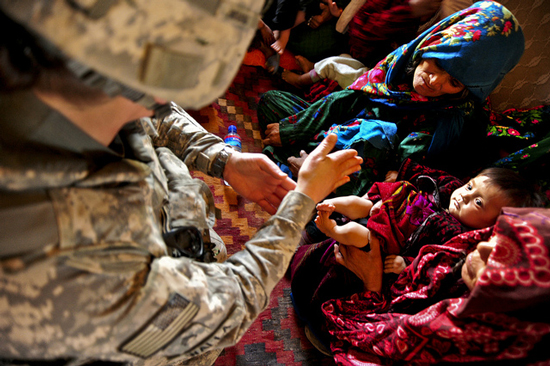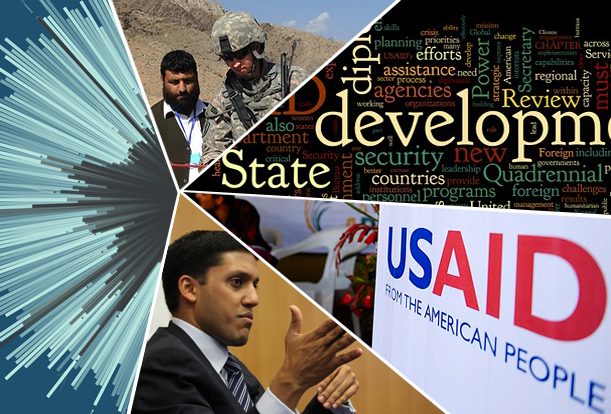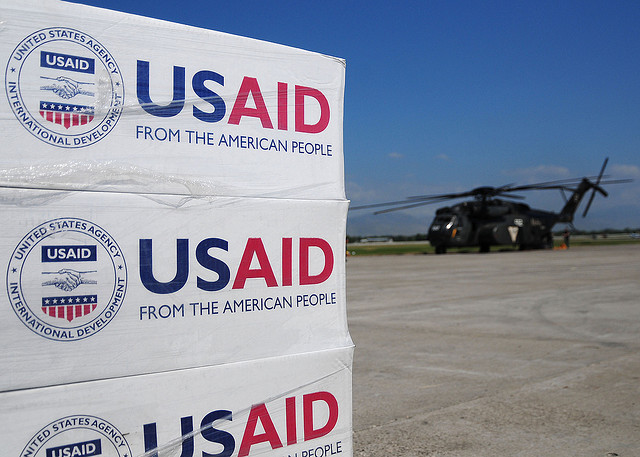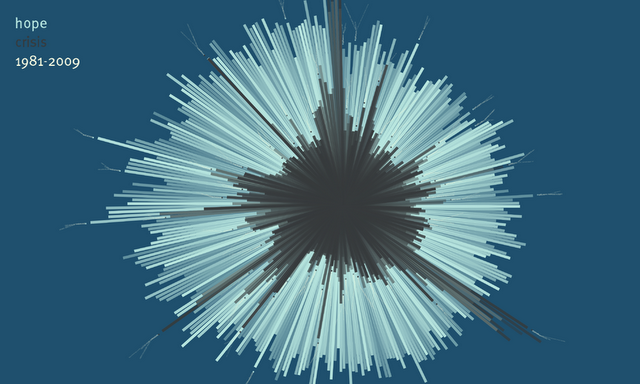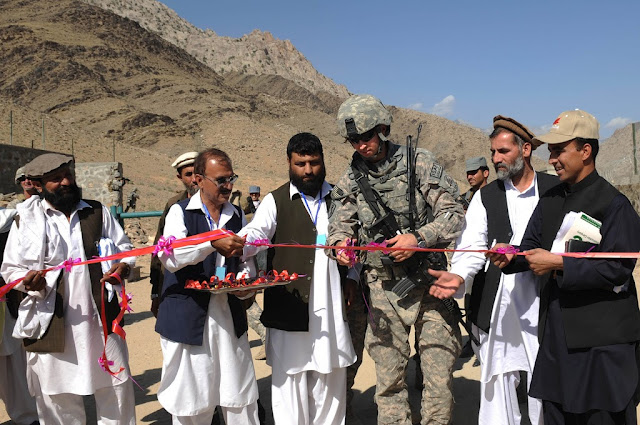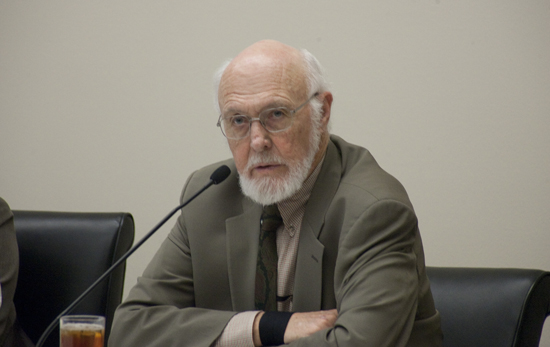-
In Search of a New Security Narrative: National Conversation Series Launches at the Wilson Center
›The United States needs a new national security narrative, agreed a diverse panel of high-level discussants last week during a new Wilson Center initiative, “The National Conversation at the Woodrow Wilson Center.”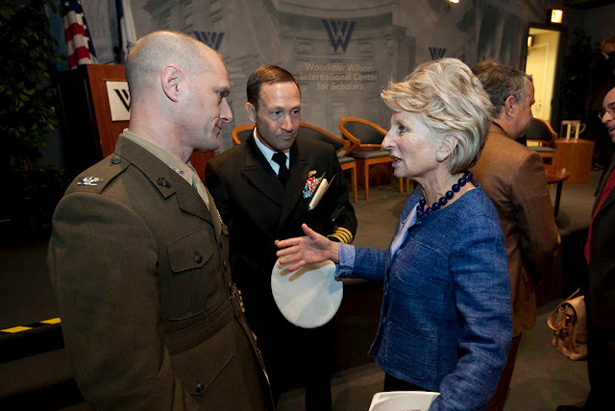
Hosted by new Wilson Center President and CEO Jane Harman and moderated by The New York Times’ Thomas Friedman, the inaugural event was based on a white paper by two active military officers writing under the pseudonym “Mr. Y” (echoing George Kennan’s “X” article). In A National Strategic Narrative, Captain Wayne Porter (USN) and Colonel Mark Mykleby (USMC) argue that the United States needs to move away from an outmoded 20th century model of containment, deterrence, and control towards a “strategy of sustainability.” [Video Below]
Anne-Marie Slaughter of Princeton University, who wrote the white paper’s preface, summarized it for the panel, which included Brent Scowcroft, national security adviser to President Ford and President H.W. Bush; Representative Keith Ellison (D-Minn.); Steve Clemons, founder of the American Strategy Program at the New America Foundation; and Robert Kagan, senior fellow for foreign policy at the Brookings Institution.Framing a 21st Century Vision
We can no longer expect to control events, but we can influence them, Slaughter said. “In an interconnected world, the United States should be the strongest competitor and the greatest source of credible influence – the nation that is most able to influence what happens in the international sphere – while standing for security, prosperity, and justice at home and abroad.”
“My generation has had our whole foreign policy world defined as national security,” said Slaughter, “but ‘national security’ only entered the national lexicon in the late 1940s; it was a way of combining defense and foreign affairs, in the context of a post-World War II rising Soviet Union.”
As opposed to a strategy document, their intention, write Porter and Mykleby, was to create a narrative through which to frame U.S. national policy decisions and discussions well into this century.
“America emerged from the Twentieth Century as the most powerful nation on earth,” the “Mr. Y” authors write. “But we failed to recognize that dominance, like fossil fuel, is not a sustainable source of energy.”It is time for America to re-focus our national interests and principles through a long lens on the global environment of tomorrow. It is time to move beyond a strategy of containment to a strategy of sustainment (sustainability); from an emphasis on power and control to an emphasis on strength and influence; from a defensive posture of exclusion, to a proactive posture of engagement. We must recognize that security means more than defense, and sustaining security requires adaptation and evolution, the leverage of converging interests and interdependencies. [italics original]
Prosperity and Security a Matter of Sustainability
The “Mr. Y” paper is similar in some respects to other strategic documents that have promoted a more holistic understanding of security, such as the State Department’s Quadrennial Diplomacy and Development Review, which was partially authored by Slaughter during her time in State’s Policy Planning Office. But there’s a markedly heavy focus on economics and moving beyond the “national security” framework in Porter and Mykleby’s white paper. They outline three “sustainable” investment priorities:
“These issues have come in and out of the security debates since the end of the Cold War, but they have not been incorporated well into a single national security narrative,” Geoff Dabelko, director of the Wilson Center’s Environmental Change and Security Program, told The New Security Beat. “This piece is a positive step toward achieving a coherent and inclusive national security narrative for the United States.”- Human capital: refocus on education, health, and social infrastructure;
- Sustainable security: use a more holistic, whole-of-government approach to security; essentially, expand the roles of civilian agencies and promote stability as much as ensuring defense; and,
- Natural resources: invest in long-range, sustainable management of natural resources, in the context of expanding global demand (via population growth and consumption).
To provide a “blueprint” for this transition, Porter and Mykleby call for the drafting of a “National Prosperity and Security Act” to replace the national security framework laid by the National Security Act of 1947 (NSA 47) and followed by subsequent NSAs.A New Geostrategic Model?
The panel unanimously praised the white paper’s intentions, if not its exact method of analysis and proposed solutions. All agreed that globalization and technology have helped create a more interconnected and complex world than current foreign policy and national security institutions are designed to deal with. Scowcroft called the 20th century “the epitome of the nation-state system” and said he expects an erosion of nation-state power, especially in light of integrated challenges like climate change and global health.
Kagan disagreed, saying he’s less convinced that the nation-state is fading away. “If anything, I would say since the 1990s, the nation-state has made a kind of comeback,” he said, adding that the paper lacks “a description of how the world works, in the sense of ‘do we still believe in a core realist point that power interaction among nation states is still important?’” In that sense, he said, “I’m not at all convinced we’ve left either the 20th century or the 19th century, in terms of some fundamental issues having to do with power.”
“I think there are three things that really are new,” said Slaughter. “The first [is the] super-empowered individual…the ability of individuals to do things that only states could.” We saw that with 9/11, with individuals attacking a nation, and we’re seeing that with communications as well, she said. “I can tell you, Twitter and the State Department’s reporting system, they’re pretty comparable and Twitter’s probably ahead, in terms of how much information you can get.”
Second, there is a “whole other dimension of power that simply did not exist before and that is how connected you are,” Slaughter said. “The person who is the most connected has the most power, because they’re the person who can mobilize, like Wael Ghonim in Egypt.”
Third, there are a greater number of responsible stakeholders. “What President Obama keeps telling other nations is ‘you want to be a great power? It’s not enough to have a big economy and a big army and a big territory, you have to take responsibility for enforcing the norms of a global order,’” Slaughter said. Qatar’s willingness to participate in the international community’s intervention in Libya, she said, was in part an example of a country responding to that challenge and stepping up into a role it had not previously played.
These new dimensions to power and security don’t entirely replace the old model but do make it more complex. “It’s on top of what was,” Slaughter said, and “we have to adapt to it.”
Photo Credit: Colonel Mark Mykleby (USMC), Captain Wayne Porter (USN), and Wilson Center President and CEO Jane Harman, courtesy of David Hawxhurst/Wilson Center. -
Book Review: Envisioning a Broader Context to Security With ‘The Ultimate Weapon is No Weapon’
›The Ultimate Weapon is No Weapon: Human Security and the New Rules of War and Peace, by a career U.S. Army officer, Lieutenant Colonel Shannon Beebe, and Professor Mary Kaldor, director of the Centre for the Study of Global Governance at the London School for Economics, is the product of an intriguing partnership. Despite the fact that their respective professions have often displayed distrust and hostility toward one another, the coauthors’ combined perspectives have created a particularly prescient and non-partisan challenge to the security status quo.
Beebe and Kaldor add to the growing call to re-evaluate existing constructs of “national security” and to reconsider the roles of Western militaries and international aid agencies in the globalized 21st century world. In particular, they emphasize the urgent need for a more nuanced understanding of security that includes humanitarian considerations as an integral component in these institutions’ agendas. This “human security” is the right of all people to livelihoods, clean drinking water, nourishing food, and education and proper health care, in addition to a safe and secure place to live, free from the fear of personal crime and violence.
Such insecurity affects us all even if it does not directly result in open warfare. According to Misha Glenny in his 2009 book, McMafia, it is estimated that 20 percent of the global GDP is generated through criminal activities, which exploit the weak and the vulnerable on a global scale. It is difficult to say what role the traditional Western military can play under situations in which vast networks of tyranny through corruption are rapidly growing.
Historical and General Context
The Ultimate Weapon is No Weapon is a persuasive argument in favor of deconstructing the conventional credo of war that has dominated U.S. military theory since World War II. Beebe and Kaldor argue that the political and financial capital mined from the Greatest Generation significantly influenced the “state-against-state” model of the American military machine, and then helped perpetuate and sustain it. The United States’ Cold War experience reinforced the notion that the goal of security is to defeat a great enemy, preferably in open battle using the best available military hardware.
But, the authors ask, did such displays of military superiority and readiness actually accomplish the strategic goal of maintaining our security in today’s world? Did we perhaps narrow the definition of security too much, and in using the wrong tools, did we worsen the very problems we set out to solve?
Beebe and Kaldor provide ample evidence to suggest we have taken the narrow approach, from NATO’s involvement in Yugoslavia, to the debacle in Somalia, and the current conflicts in Afghanistan and Iraq. The authors are not simply out to criticize the military, but instead suggest that the lines that define nation-states today no longer hold the same power that they once did. Other forces at work, from economic globalization to climate change, must be recognized.
Definitions and Prescriptions for a Changing World
When civilians become targets of violence, their resilience is weakened, write Beebe and Kaldor, for a variety of reasons that are often difficult to ascertain without on-the-ground intelligence. For instance, is violence against civilians intended to provide opportunities for political gain by certain groups, or just cover up criminal behavior intended for monetary gain? In this kind of environment, where does the modern Western military machine fit, and how can international humanitarian institutions be more effective?
Beebe and Kaldor contend that instead of developing strategic operations focused on killing the enemy, the military should be focused instead on creating safe spaces for civilians:A human-security approach would emphasize bottom-up reconstruction of governance and justice systems, local security capabilities, and, of course, addressing poverty, education, and health. It would, as well, have to be part of a more global strategy for dealing with the transnational criminal networks, especially drug networks, that are nourished by and that nourish conflicts (p. 196).
Even if it is not the sole responsibility of the military to provide such resources, the authors argue, failure to recognize the importance of human security or to protect resources will ultimately increase our security risks.
An Unobtainable Utopia or Early Warning?
Undoubtedly, the problems that the authors describe are real; it is time to re-evaluate what kind of world we want to live in and how this might be achieved. What should we do if there is no legitimate state government to negotiate with, and yet there is clearly a violent and deadly situation, such as the 1994 genocide in Rwanda? Would the American people tolerate spending money on a military operation without there being any direct sign of imminent threat or danger to them, and without the ability to declare some sort of traditional military victory? Or would their reaction be the same as Neville Chamberlain’s to Czechoslovakia in 1938, that human security merely describes “a quarrel in a faraway country between people of whom we know nothing?”
The recent intervention in Libya is a case in point. Speaking on Meet the Press recently, Secretary of Defense Gates admitted that the country was of no vital interest to the United States, and instead defended spending money on military air strikes based upon humanitarian grounds. Despite the clear mandate from the UN, NATO, and the Arab League to respond to this human security crisis, there has clearly been little appetite in the United States to lead military interventions in Libya without an obviously defined motive of self-interest.
The difficulty lies in explaining that basic security and instability have grave consequences, even across great distances, and that addressing potential conflicts early prevents the need for making harder choices later on. The U.S. Department of State has tackled that difficult task in the recent Quadrennial Diplomacy and Development Review, which calls for greater focus on human security interventions as a way to avoid or mitigate future military conflicts.
Though a few of the solutions postulated in this book may seem overly idealistic to some, I would argue that Beebe and Kaldor’s ideas represent less a utopian vision than an early warning and plea for change in the years to come. Rather than succumbing to the easy temptation to fear globalization and the world outside our borders, we must learn to engage with and help create a thriving global civil community.
A must-read for a broad range of audiences, The Ultimate Weapon is No Weapon offers a historical and contemporary basis for envisioning a broader context to security and understanding that the “ultimate weapons of the twenty-first century are, in fact, not weapons in the military sense at all” (p. 202).
Tracy Walstrom Briggs is currently the Minerva Associate Chair for Energy and Environmental Security (USAF). She has worked with the Swedish Defense Forces (FOI) and the UN Environment Programme to facilitate more sustainable peacekeeping installations using rapid impact assessment tools. She was also a professor and associate chair for the Graduate Environmental Studies Program at California State University Fullerton.
Sources: HistoryVideos101, McMafia (Glenny), NBC, U.S. Department of Defense.
Photo Credit: “3-6 Soldiers Provide Medical Aid,” courtesy of flickr user expertinfantry. -
QDDR Coverage Wrap-up: Institutional Shifts, Development-as-Security, Women’s Empowerment, and Complex New Threats
›February 23, 2011 // By Schuyler NullSomewhat lost in the wake of turmoil in the Middle East and the budget battle in Congress has been the State Department’s most aggressive attempt yet to reshape itself for the dynamic foreign policy challenges of the 21st century.
-
USAID’s Role in National Security: Development Matters and It’s Cheaper Than You Think
›February 22, 2011 // By Ramona Godbole“Development is not and cannot be a sideshow,” said U.S. Agency for International Development (USAID) head Rajiv Shah, in a speech at the Center for Global Development on January 19. This year marks the 50th anniversary of USAID, and there are some promising changes in the works for the agency as it transforms itself into a “modern development enterprise.”
Over the past year, the Obama administration launched the Quadrennial Diplomacy and Development Review (the QDDR – see our full set of reviews on this first-of-its-kind document), Feed the Future, and the Global Health Initiative. In accordance with these new strategic initiatives, USAID has launched USAID Forward to implement a series of reforms to strengthen its capacity to meet the world’s development challenges effectively and efficiently. The agency has tried to foster a “spirit of innovation, science, technology, and smarter strategic thinking to each of [its] areas of core focus: gender, education, water, and climate,” said Shah. In his speech at CGD, he announced a new, re-worked evaluation policy and outlined a number of cost-saving actions, including graduating countries that no longer need aid, promoting procurement and contracting reform, and eliminating some costly senior positions in the agency.
Value to Shareholders
Moving forward, USAID is working to further reduce inefficiencies and increase transparency, said Shah, and is “focused on delivering the highest possible value for our shareholders – the American people and the congressional leaders who represent them.” He added that “like an enterprise, we’re relentlessly focused on delivering results and learning from success and failure.”
These are exciting changes for the development community. But, if Congress significantly cuts funding, by, for example, passing a plan similar to one endorsed by 165 Republican representatives a few weeks ago, these changes might not see the light of day – the plan proposed to save $1.39 billion by eliminating agency operating expenses. Putting that in perspective, the USAID operating budget for the past fiscal year was $1.69 billion. (Strangely, while the plan all but eliminates the agency that administers them, it does little to cut actual outgoing foreign assistance monies.)
The plan, however, may reflect the views of much of the American public. A World Public Opinion poll showed that Americans believe the government spends up to 25 percent of its budget on foreign aid and want to cut back to 10 percent, while in fact, aid represents just one percent of the federal budget (compared with more than 20 percent for defense).
What the proposed plan fails to take into account is development’s role in promoting peace, security, and prosperity globally. Said Shah at CGD, “as the President and the Secretaries of State, Treasury, and Defense have all made abundantly clear, development is as critical to our economic prospects and our national security as diplomacy and defense.”
A More Efficient Investment
Shah elaborated on this idea in an interview with Foreign Policy last month: “In the military they call us a high-value, low-density partner because we are of high value to the national security mission but there aren’t enough of us and we don’t have enough capability,” he said. “This is actually a much, much, much more efficient investment than sending in our troops, not even counting the tremendous risk to American lives when we have to do that.”
Chad Briggs, a professor for the USAF Air University, pointed out the multiple benefits to the military that increased State and USAID agency in the field could provide in his review of the QDDR:Considering the existing responsibilities of the United States overseas and the potential for future risks and crises that will need to be addressed, the QDDR’s recommendations to strengthen engagement abroad can only be a positive step for U.S. interests. If the various hurdles enumerated above and elsewhere can be addressed, the QDDR’s focus on emerging risks may also ease the burden on DOD resources and force deployments, recognizing that not every engagement abroad should be resolved by the military alone.
If done right, development can provide both economic growth and democratic governance and help stabilize countries before, during, and after conflict or crisis in a cost-effective way while simultaneously addressing transnational human and environmental security issues like hunger, poverty, disease, and climate change (see Yemen for an example where the application of soft power now could reduce the chance of deploying more hard power later).
Policymakers should support USAID’s current efforts to make smarter investments, “which over time will save hundreds of millions of dollars, as opposed to trying to save a little bit now by cutting our capacity to do oversight and monitoring,” said Shah in Foreign Policy.
Sources: Center for Global Development, The Economist, Foreign Policy, USAID, U.S. Department of State, World Public Opinion.
Photo Credit: “Pallets of food, water and supplies staged to be delivered,” courtesy of flickr user USAID_Images. -
Watch: Geoff Dabelko and John Sewell on Integrating Environment, Development, and Security and the QDDR
›“We all must check our stereotypes of the other communities at the door…we’re not talking about hugging trees and hugging pandas,” said Geoff Dabelko, director of the Wilson Center’s Environmental Change and Security Program, in a panel discussion on Foreign Policy Challenges in the 112th Congress as part of the Wilson Center on the Hill series. Dabelko argued for a more multi-dimensional and integrated approach to addressing environmental issues.
“To tackle these problems, these connections between, say, natural resources, development, and security, it really does require that we have an integrated approach to our analysis [and] an integrated approach to our responses,” Dabelko said.
In dealing with climate change, for example, “a more diversified view would be one where we spend more time trying to understand adaptation,” said Dabelko. “How are we going to deal with the expected impacts of these problems?” he asked.
Dabelko called on policymakers to seek “triple bottom lines,” pointing out that “if you’re worried about climate change, or you’re worried about development, or you’re worried about fragile states, some of the same governance interventions and strong institutions in these fragile or weak states are going be the ones that will get you benefits in these multiple sectors.”
The Political Space
Fortunately, the current political environment is one in which “there is political space for integration,” said Dabelko, as demonstrated by, for example, the Quadrennial Diplomacy and Development Review (QDDR), which Wilson Center Senior Scholar John Sewell addressed in his remarks.
“All of you who are directly or indirectly engaged in Congress are going to be faced with a very important opportunity in the next 12 to 24 months,” Sewell said, “to focus both diplomacy and development on the major challenges that are going to face all of us in the first half of the century.”
Calling the QDDR a “major rethink of both American diplomacy and American development,” Sewell applauded its conceptual alignment, but cautioned that the review leaves many questions unanswered about its implementation.
“The QDDR sets no criteria,” said Sewell. “Are we going to continue to put large sums of money into countries that aren’t developing? Are we going to follow the choice of issues – food, environment, and so on and so forth? It’s a question that is not answered in any of these documents.”
Sewell also pointed to potential clashes over budgeting, USAID/State leadership, and the lack of coordination with other large development agencies, like the World Bank and International Monetary Fund.
For more on Sewell’s analysis of the QDDR, see his recent blog post “Reading the QDDR: Is the Glass Half Full or Half Empty?” -
Civilian Power in a Complex, Uncertain World
›Leading Through Civilian Power: The First Quadrennial Diplomacy and Development Review (QDDR) initiates an encouraging process of rethinking and restructuring that is long overdue. It explicitly links itself to the 2010 National Security Strategy and echoes the latter’s commitment to “national renewal and global leadership.” It refers briefly to the obvious companion document, the Quadrennial Defense Review, although it resists engaging with some key aspects.
-
First Steps on Human Security and Emerging Risks
›The 2010 Quadrennial Development and Diplomacy Review (QDDR), the first of its kind, was recently released by the State Department and USAID in an attempt to redefine the scope and mission of U.S. foreign policy in the 21st century. Breaking away from the Cold War structures of hard international security and an exclusive focus on state-level diplomacy, the QDDR recognizes that U.S. interests are best served by a more comprehensive approach to international relations. The men and women who already work with the U.S. government possess valuable expertise that should be leveraged to tackle emerging threats and opportunities.
-
Is the Glass Half Full or Half Empty?
›The much-anticipated Quadrennial Diplomacy and Development Review(QDDR) demands to be taken seriously. Its hefty 250 pages present a major rethink of both American development policy and American diplomacy. Much of it is to be commended:
Showing posts from category QDDR.


